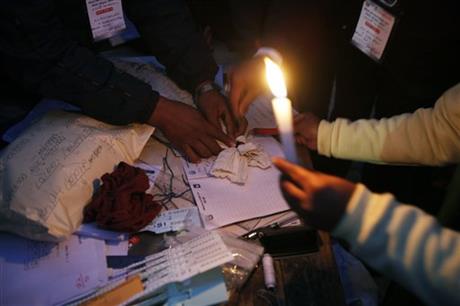
By BINAJ GURUBACHARYA
Nepalese election officials seal the leftover ballot papers after the voting time was over at a polling station in Katmandu, Nepal, Tuesday, Nov. 19, 2013. Nepalis went to the polls to choose a special assembly to draw up a long-delayed constitution, a step toward stability in a nation still reeling from a 10-year communist revolt and the overthrow of a centuries-old monarchy. (AP Photo/Niranjan Shrestha)
APTOPIX Nepal Election
Nepalese people gather to watch election officials finish the polling procedures at a polling station in Katmandu, Nepal, Tuesday, Nov. 19, 2013. Nepalis went to the polls to choose a special assembly to draw up a long-delayed constitution, a step toward stability in a nation still reeling from a 10-year communist revolt and the overthrow of a centuries-old monarchy. (AP Photo/Niranjan Shrestha)
Nepal Election
Nepalese election officials make notes after sealing ballot boxes after voting time ended at a polling station in Katmandu, Nepal, Tuesday, Nov. 19, 2013. Nepalis went to the polls to choose a special assembly to draw up a long-delayed constitution, a step toward stability in a nation still reeling from a 10-year communist revolt and the overthrow of a centuries-old monarchy.. (AP Photo/Niranjan Shrestha)
Nepal Election
Nepalese election officials carry ballot boxes after voting closed at a polling station in Katmandu, Nepal, Tuesday, Nov. 19, 2013. Nepalis went to the polls to choose a special assembly to draw up a long-delayed constitution, a step toward stability in a nation still reeling from a 10-year communist revolt and the overthrow of a centuries-old monarchy. (AP Photo/Niranjan Shrestha)
Prev
1 of 4
Next
KATMANDU, Nepal (AP) — Election officials on Wednesday began counting votes Nepal’s people cast to choose a special assembly to draft a long-delayed constitution and pick a new government.
Boxes filled with paper ballots were continuing to reach counting centers and counting has started in 31 of the nation’s 75 districts, Election Commission official Bir Bahadur Rai said.
The first results, once expected by Wednesday, were likely to be announced late Thursday, Rai said.
He said several minor disputes between candidates while votes were being counted were being settled by the elections officials posted in the counting centers. There were no reports of any major trouble.
In the capital, Katmandu, election officials opened ballot boxes collected from all 10 constituencies at the International Convention Center and began counting the thousands of ballots. Outside, thousands of people were cheering for their candidates and political parties. Votes would be counted throughout the night.
Rai said arrangements were being made to fly ballot boxes from some mountain areas by helicopter because snow had blocked roads. Most of the 75 districts in the Himalayan nation are mountainous.
More than 70 percent of the 12 million eligible voters cast their votes during Tuesday’s election to choose the 601-member Constituent Assembly that would double as the parliament.
Officials called the election successful and mostly free of violence. A bombing near a polling station in Katmandu injuring three people, voting was suspended in one village and police fired into the air in another village when opposition activists stormed a polling station. Pre-election violence injured at least 30 people after an alliance of 33 opposition parties vowed to disrupt the polls and blockaded transport.
Final election results will take at least a week. None of the political parties is predicted to win a majority and a coalition government is likely, which could take days to form even after the final results are announced.
The United Communist Party of Nepal (Maoist), the party of the former communist rebels, is hoping to repeat the last election and emerge as the largest party. Its main competitors are the Nepali Congress and Communist Party of Nepal (United Marxist Leninist).
The last assembly, elected in 2008, failed to fulfill its task of writing a constitution because of squabbling among political leaders over who got to lead the nation. They also disagreed on creating a federal system divided by ethnic groups or by geography. The resulting power vacuum has left Nepal without a proper constitution for nearly seven years.



